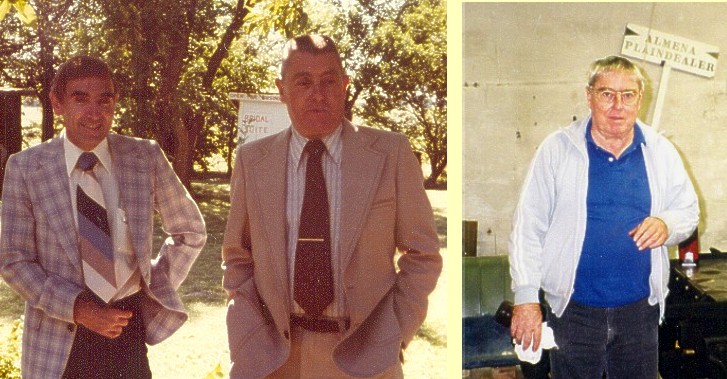
Kansas Snapshots by Gloria Freeland - March 2, 2012
Thanks, boss!
I had worked at other jobs - shelving books at the school library, de-tasseling corn, serving as an aide in a nursing home. But working with Bill Krause at the Peabody Gazette-Herald in the summer of 1973 was my first professional foray into my chosen field of journalism after editing my high school paper.
During that summer, I wrote about a fire that caused severe smoke and water damage to a historic home in my hometown; a couple who made spinning wheels out of native walnut; a man who restored an old buggy; and Oscar Stauffer, an early-days Gazette-Herald owner who went on to found Stauffer Publications.
I also picked up ads and then laid them out on the pages. It took me awhile to find just the right clip art of various grocery items and then type the accompanying prices for one full-page grocery ad.
I also learned how to do paste-up using columns of type we ran through a waxer and then laid out on the page. From there, I took pictures of the finished pages with the large process camera, "opaqued out" any specks of dust that appeared on the negatives, and then transferred those images to the printing plates, which went on the press. I think I did almost everything but run the press.
At the end of my three-month stint, I wrote a column about the experience. The following is a part of that piece.
"To be quite honest, I thought that working on a small-town newspaper would be rather dull when I first started at the Gazette-Herald in May. I've had dreams of working on larger newspapers in big cities and of course I hope those dreams come true some day ...
"For a first-time job in the field I'm majoring in, the Gazette has been great experience. Where else but on a small-town newspaper could a person report on UFOs, council meetings, historical news, local news and other items, as well as set up ads, write editorials, proofread, do darkroom work, help with the mailing and do other miscellaneous jobs? Certainly I wouldn't get this variety of experience working on a large newspaper. Besides that, no place but in a small town can one get to know the people and their attitudes, emotions and ideas so well ...
"I think I'm hooked on journalism. How else could you explain me grabbing a pencil and notebook every time I hear a fire alarm or hear a rumor which might be a scoop other than to say, 'I've got journalism in my blood?'"
I enjoyed my summer so much that I offered to help Bill again during my 1973-1974 winter break. I wrote about the annual Chamber of Commerce meeting and the death of Peabody native Al Stovall, who was a banjoist, manganese miner and motel magnate.
Driving home after a day at the paper was a lonely affair because of the record-cold temperatures that winter - near 0 for many days in a row. The back roads' intersections had to be approached with caution as the drifts were high. One evening, it took so long to get home that Dad was warming the car up to go look for me just as I pulled into the driveway. But that weather also provided good subject matter for another piece.
Bill "retired" in 1997 when he sold his newspaper operation. But he stayed involved in the business, collecting an impressive array of old printing presses from around the state - including the Almena Plaindealer letterpress, which was the last of its kind in operation in Kansas. He opened a printing museum - considered one of the finest in the region - in downtown Peabody.
Bill died Dec. 6, 2011, in Peabody. He was 88. His obituary listed his World War II service in Europe. It also told about his involvement in politics. He was the Fourth District Republican candidate for Congress, but was defeated by Dan Glickman in the 1984 general election. He was also active in local government and in other aspects of his community.
But to me, Bill Krause was the epitome of a "crusty old editor," a bit like the Lou Grant character on the old "Mary Tyler Moore Show." He was a bit gruff and didn't have a lot of patience for people who didn't work hard. But in spite of our different political leanings, we got along just fine.
I think the last sentence in his obituary summed up the man I knew the best:
"Although he was skilled and active in all phases of producing weekly newspapers, he enjoyed the writing most of all."
That sentence confirmed what I always suspected: he was a man after my own heart. Thanks, Bill, for the opportunity to work for you and for what you taught me.

Left: My two bosses, K-State's Collegian advisor Bill Brown, left, and Bill Krause, were guests at my wedding in 1979 on the Freeland farm. Someone wrote on the old outhouse - visible over Krause's right shoulder - "Bridal Suite, open for business;" right: Krause in 1997 in his press museum.
Comments? [email protected].
Earlier columns from 2012 may be found at: 2012 Index.
Links to previous years are on the home page: Home